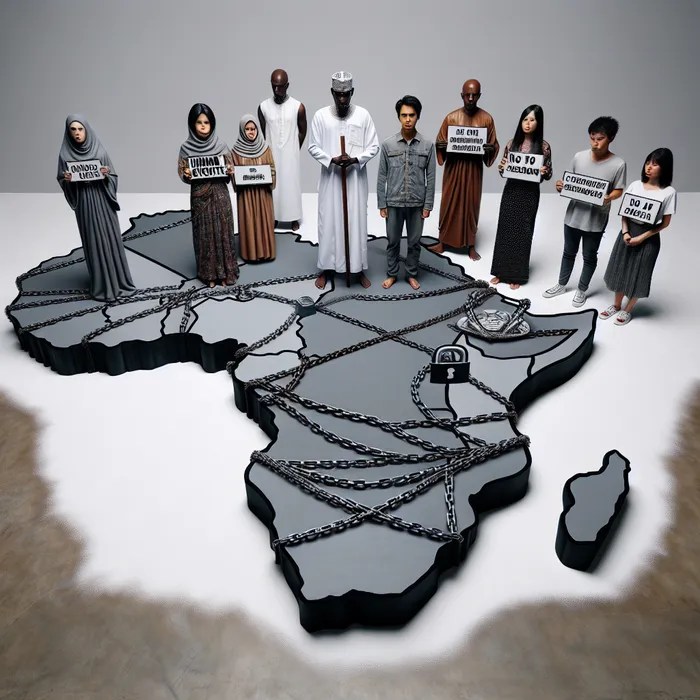MTN's ethical dilemma: human rights violations amid internet shutdowns
Telecommunications

MTN says it complies with all legal requirements in the 19 markets where it operates across the African continent, and advocates for digital human rights. Many non-profit organisations around the world have expressed deep concern about internet shutdowns in Africa.
Image: AI Lab
MTN is more widely known for the communication, education, and financial benefits its mobile and internet services bring to 19 African markets, but allegations of human rights violations due to internet shutdowns ordered by governments in conflict continue to surface, raising an ethical dilemma for the group.
Business Report was shocked to view an investigation by Opensecrets.org.za into these alleged human rights abuses by MTN in countries such as Afghanistan, the Democratic Republic of Congo, Nigeria, Iran, and Sudan, all carried out by government decree. Typically, the cellphone and internet operator in a country is bound by its contract with the government or its communications regulator to suspend the provision of internet services, when instructed to do so.
The human rights abuses extend beyond the obvious use of an internet shutdown to stymie enemy communications or civil dissent. They encompass the fact that electronic communications now fall into the realm of basic human rights, including freedom of speech and access to information.
Restricting access to critical digital platforms in times of crisis stifles not only free expression but also access to healthcare and life-saving information. Internet platforms are not solely for social communications; they are lifelines in times of crisis, allowing the rapid dissemination of alerts about safety, shelter, and emergency services.
Some examples gleaned from Sudan are helpful at this stage. On January 22, 2025, Sudan’s National Communication Authority directed all internet service providers, including MTN, to block access to social media for up to 90 days in South Sudan. This was allegedly to block the spread of social media videos showing South Sudanese villagers being killed, reportedly by the Sudan army.
In 2019, a long internet shutdown in Sudan was lifted when a Sudanese lawyer lodged a lawsuit, and the court ordered his internet service provider, Zain, to restore his service. The lawyer then launched a class action suit, and on July 9, 2019, the court ordered MTN, Sudani, and Zain to restore services for all their customers, which they did promptly.
The #KeepItOn coalition, a global network of over 334 human rights organisations from 105 countries working to end internet shutdowns, stated on its website: “It’s official, 2024 was the worst year on record for internet shutdowns. From people’s movements to contentious elections, as political escalations continued to make headlines in Africa, authorities increasingly defaulted to internet shutdowns to disempower and disconnect people.”
MTN, which was specifically investigated by Opensecrets.org.za on this matter, has three major shareholders, one of which is the Public Investment Corporation with about a 20.42% stake, and Coronation Asset Management, one of South Africa’s biggest asset managers holding about R676 billion of assets under management.
Millions of South Africans are likely to be indirectly invested in MTN through their investments or pensions, as the group ranks among the JSE’s Top 40 in terms of market capitalisation. Asset managers have a duty to act in their clients’ best interests, which includes investing responsibly and ethically.
So the dilemma is this: While government-mandated internet shutdowns may be legal, are they ethical, especially in countries in conflict?
MTN is well aware of the problem and appears to have gone to great lengths to inform its stakeholders about the issue, such as through the publication of its Transparency Report, which details instances of internet shutdowns and actions the group takes to deal with it.
In response to Business Report's questions on this matter, MTN stated: “As a matter of course, MTN Group operates within the regulatory frameworks of each market we serve, ensuring strict compliance with all applicable laws and licensing agreements.”
“We are committed to digital human rights, which includes respecting the rights of all individuals to communicate, access, and share information freely and responsibly, prioritising human rights and avoiding involvement in activities that could potentially fuel unrest or rights violations,” it said.
Specific to the Open Secrets report regarding internet shutdowns in several conflict-affected countries, including Sudan, Cameroon, Afghanistan, Uganda, and Iran, which MTN holds for investment purposes, the company stated: “In each instance, MTN has complied with government directives as required by law, while advocating for policies that minimise service disruptions and uphold the rights of our customers.”
Its Transparency Report lists a sharp increase in requests for service restriction orders and internet shutdowns, from 27 in 2022 to 196 in 2023.
“This uptick raises concerns about governmental actions impacting freedom of expression and access to information, signaling a potentially concerning trend in restricting online services for various reasons,” MTN said in the report.
A decrease in criminal investigation requests from 81 262 in 2022 to 74 134 in 2023 may signify a proactive shift in law enforcement strategies, MTN noted. A decline in regulatory oversight requests from 1 507 in 2022 to 295 in 2023 likely indicated a shift in regulatory priorities or a refinement of regulatory frameworks in response to changing technology dynamics or policy considerations.
Lawful interception requests increased from 267 in 2022 to 1 476 in 2023, suggesting a heightened focus on monitoring communications for security reasons or responding to emerging threats.
MSISDNs and subscriber identification requests increased sharply from 88 575 in 2022 to 130 480 in 2023, signaling an escalating demand for subscriber information driven by the expanding digital landscape, increased use of mobile services, and the imperative for comprehensive user identification.
“We continuously assess the impact of our operations on the populations we serve and strive to balance our legal obligations with our ethical responsibilities,” MTN said.
BUSINESS REPORT
Related Topics: